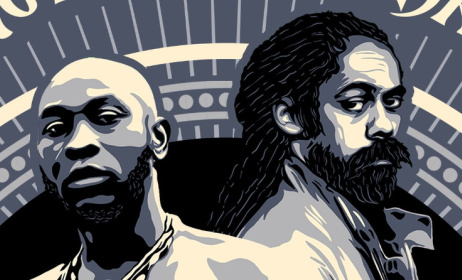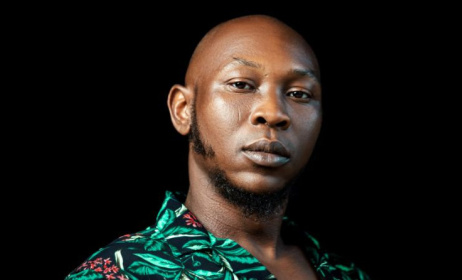Four 'Mavericks' and a Felabration concert
For the second consecutive night Bez closed his set with ‘That Stupid Song’. For the second straight night he jumped, guitar in hand, to strike one final note. The first night he was looked upon as a curiosity. This time, on 13 October, he received quite the applause. What had changed?
 Seun and Femi Kuti. Photo: TIA
Seun and Femi Kuti. Photo: TIA
The venue perhaps. The first time he was at the Afrikan Shrine; free entry. The second he was at the Federal Palace Hotel in Victoria Island, Lagos. Where the least tickets had sold for 5000 naira (about $15), his rockstar hijinks seemed more appreciated. The show, Mavericks Felabration Night, was sponsored by alcoholic beverage Glenfiddich and part of the annual celebration of Fela.
The second “maverick”, Nneka, succeeded Bez. She put on a soberly sophisticated show. As with her music, her performance had some activism. "I need to say something before I leave though the music speaks," she said towards the end of her performance. She proceeded to speak about corruption and division in Nigeria.
In between performances, the always rousing Fela music came on, forcing most of the crowd to their feet. Listening to Fela’s Afrobeat, I was reminded again of his brilliance. Besides Fela, the rest of Nigerian music is a pile of self-satisfied averageness.
"I always start my shows like this with one of my father’s songs as a sign of respect to the man," said Seun Kuti. The song was Fela's seventies tune ‘Expensive Shit’. Seun did his thing, affecting Fela's moves. The sound, once so good, had become disappointing. And because Seun's music is known by more foreigners than locals, he got attention not fan-worship.
"Both Femi and Seun are better received internationally than here," said one dancing German. While that might be true, the Afrikan Shrine remains a draw, and if Seun has no real hit song locally, Femi Kuti has had a few. Both are decent musicians but to listen to them is to observe how a father's greatness is equal to his brilliant sons' inadequacy.
The night’s last "maverick", Femi Kuti, came onstage by 2.30 am, and was introduced as “King of Afrobeat" and "four-time Grammy nominee”. He gave stern unspoken directions to his Positive Force band and played the piano like a maniac, stage lights convulsing around him. The living Kutis are believers in effort, their physicality mingling with their music. In contrast, their father's stage movement was marked by a comic genius that masked his own physical exertions. Onstage, Femi Kuti is taskmaster, Seun is antsy, Fela was an artist.
At one point Femi held a note so long, the effect strained the ears, but beauty was not the goal—we were meant to applaud the effort, which we did. His cheeks were engorged, sweat glistened his forehead, the sax in his mouth becoming a pacifier that would not satisfy its holder.
Femi paused to berate the organisers for the show's delay. "I wouldn't wait that long but I'm happy you're here," he said, before castigating the UK for keeping President Buhari in one of its hospitals without the British media revealing his location. The music then resumed as did the dancing.
At the close of his set, the audience, which by now had gathered at the foot of the stage, asked for one more song. They got it, then it was time to leave.






























Comments